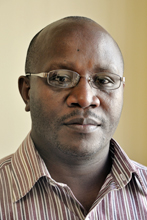
Incorporating Health Workforce Issues into Reproductive Health Advocacy
Patrick Mugirwa is a program officer with Partners in Population and Development (PPD) Africa Regional Office. PPD is a CapacityPlus associate partner. In February he spent a week at CapacityPlus’s Washington, DC office to plan jointly for upcoming activities.
Please tell us briefly about PPD.
PPD is a southern-run and southern-led intergovernmental alliance established in 1994 to support the implementation of the ICPD Program of Action. In order to invigorate south-south cooperation on the African continent, PPD Africa Regional Office was established in 2007. PPD has a vision, which is really to create a platform for promotion and resource mobilization for reproductive health and population development anchored around three elements. One is advocacy and policy dialogue, two is networking and building regional strategic partnerships, and three is sharing experiences and best practices.
PPD has a vision, which is really to create a platform for promotion and resource mobilization for reproductive health and population development anchored around three elements. One is advocacy and policy dialogue, two is networking and building regional strategic partnerships, and three is sharing experiences and best practices.
What are one or two ways PPD advocates for reproductive health?
One of our target audiences are the parliamentarians. We draw our energy to advocate for reproductive health based on a number of commitments that governments have signed—like the Maputo Plan of Action, Abuja Declaration, ICPD Program of Action. So we think PPD can engage these parliamentarians to make their countries accountable on the commitments they have signed themselves. What is it the countries have done, what are the progresses, what are the constraints, and what are the enabling factors for others to learn from them?
Another target audience are the high-level technical people at the level of directors in the governments. Pretty much you find that even when policies are in place they need to be moved, they need to be implemented. So where we find that technical people are not moving so fast, we bring them aboard and they become our target audience for advocacy as well.
How do you think learning more about health workforce issues will support PPD’s advocacy work?
To talk about sexual and reproductive health, which is the core of PPD’s advocacy, and not to talk about human resources for health—then the equation is not complete. It is the whole continuum of components, and of course human resources for health is part and parcel [for service delivery]. So for us to have meaningful advocacy for sexual and reproductive health, of necessity human resources for health must be one of the major components we must advocate for, otherwise the equation remains incomplete.
I think PPD and CapacityPlus are like-minded, and our objectives seem to be the same. Whether we talk of human resources for health or sexual and reproductive health, we are really talking about this same issue, because behind every good health outcome there must be numbers behind it—and by numbers here I’m talking about human resources for health.
Related items:
Photo by David Nelson. (Patrick Mugirwa)


